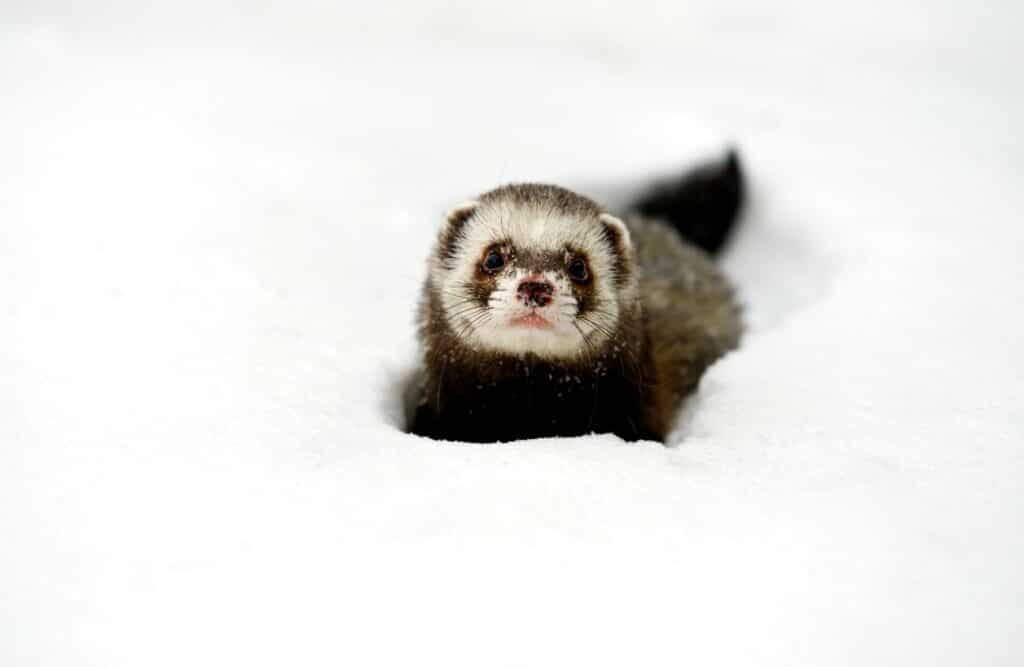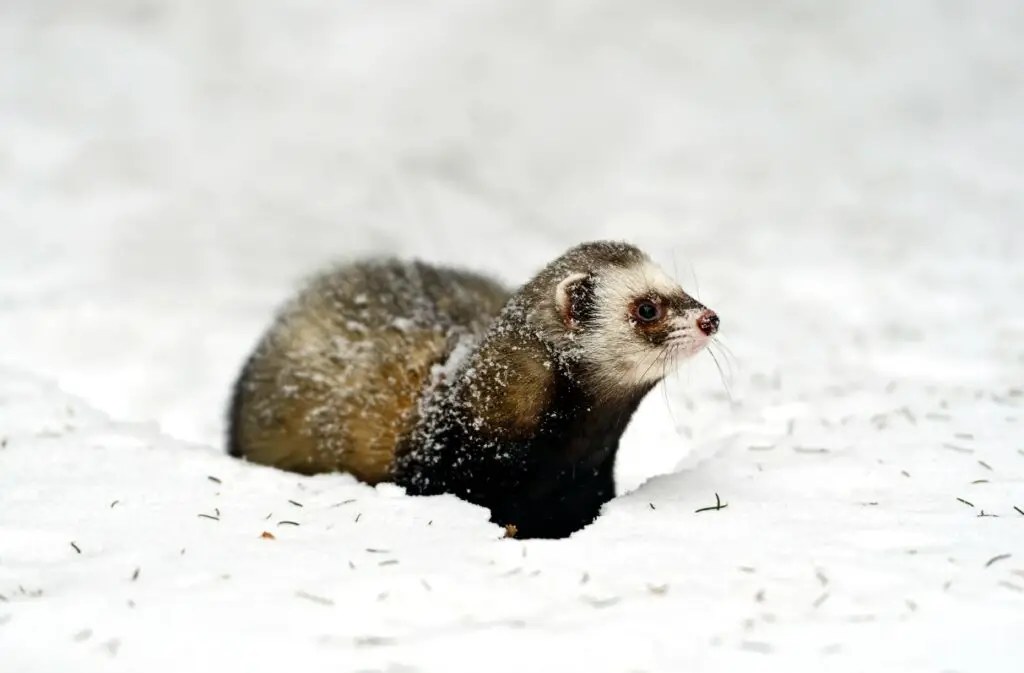Ferrets are well known for being playful creatures, and many pet owners enjoy watching them play. But can ferrets play in the snow?
Ferrets are well suited for playing in the snow! They have a thick coat of fur that helps keep them warm, and their small feet are perfect for paddling through the soft stuff.
Just make sure you bring your ferret inside for a warm-up break every so often to avoid them getting too cold.
But there is more to know when it comes to outdoor playing with your furry friend, in this article we’ll explore: what temperature is too cold for your ferret, if ferrets are exposed to frostbite, winter activities for ferrets, and the best ways to keep your ferret warm in winter.
Just keep reading!
Do all ferrets enjoy the snow?
As any ferret owner knows, these small, furry creatures are full of energy and have a mischievous streak. Ferrets are also known for their love of exploring, and they often like to burrow into small spaces.
Given their adventurous nature, it’s no surprise that many ferrets enjoy playing in the snow.
The cold weather doesn’t seem to bother them, and they often have a blast chasing snowflakes and diving into snowbanks. However, not all ferrets enjoy the snow. Some ferrets prefer to stay indoors where it’s warm, and others simply don’t like the feeling of being cold.
So if you’re wondering whether your ferret will enjoy the snow, the best way to find out is to let them play in it!
What temperature is too cold for a ferret?
Ferrets are playful, energetic creatures that make popular pets. But unlike dogs or cats, ferrets have very limited tolerance for cold temperatures. In fact, anything below 50 degrees Fahrenheit is considered too cold for a ferret.
At this temperature, ferrets are at risk for developing hypothermia, which can be fatal if left untreated.
Pro tip: Even if your ferret has tick fur, keep in mind that they are susceptible to all sorts of ailments, so dress them warmly and keep an eye on the temperature.
Can ferrets get frostbite?
Ferrets are susceptible to frostbite because they have very little body fat and their fur does not provide much insulation. In addition, their bodies are not very efficient at regulating their internal temperature. As a result, ferrets can easily get frostbite if they are exposed to cold temperatures for too long.
As with any animal, it’s important to be able to recognize the signs of frostbite in your ferret.
Signs of frostbite include:
- Red feet
- Numbness
- Stiffness
- Cold to the touch
If you see any of these signs, bring your ferret inside and warm them up slowly.
How do I keep my ferret warm in the winter?
During the winter months, many pet owners worry about how to keep their furry friends warm. This is especially true for those with ferrets, as these small animals are particularly susceptible to the cold.
However, there are a few things you can do to make sure your ferret stays warm in winter.
- Get them a warm ferret hammock or sleeping bag.
- Line their cage with thick towels or blankets.
- Winter jackets for ferrets help your pet stay warm on walks and during playtime.
These are just some of the ferret winter supplies that can help your pet stay warm during the colder months.
What do ferrets do in the winter?
They love to romp and burrow, chasing each other through tunnels of snow.
If you have an adventurous ferret, they may enjoy playing in the snow.

But even if your ferret prefers to stay indoors, there are still plenty of winter activities you can do with them!
Here are a few ideas:
- Tunneling. Encourage your ferret’s natural instinct to burrow by making a small tunnel in the snow for them to play in.
- Chasing. Most ferrets love to run and chase, so try playing a game of “ferret tag” in the snow!
- Treasure hunt. Hide some of your ferret’s favorite toys in the snow and let them search for them.
These are just a few ideas for winter fun with your ferret. But of course, every ferret is different, if your ferret doesn’t enjoy the snow be sure to try some other indoor winter activities!
Can ferrets live outside in winter?
Most ferrets are bred in captivity and have never known anything but a life indoors. However, some owners choose to let their ferrets live outside, for example in some outdoor enclosure shelters.

Their thick fur coats may provide some protection from the cold winter, but they do not have the same kind of insulation as other animals, such as rabbits and foxes. As a result, ferrets can easily become chilled in winter weather and may even develop frostbite.
The truth is that if ferrets are kept in pairs they can warm up each other in the cold winter, that’s what I wrote in a recent article.
What temperatures do ferrets enjoy the most?
The ideal temperature for ferrets is between 70 and 80 degrees Fahrenheit. They can tolerate temperatures as low as 50 degrees Fahrenheit, but they prefer temperatures of 70 to 80 degrees Fahrenheit. In general, ferrets thrive in a temperate environment.
Conversely, if the temperature rises above 80 degrees, ferrets may start to pant and become dehydrated. They may also be at risk for heatstroke. As a result, it is important to maintain a consistent temperature in the ferret’s environment to ensure their health and well-being.
Do ferrets like hot or cold weather?
When it comes to temperature, ferrets prefer moderate weather and do not do well in extreme conditions. In hot weather, ferrets can become overheated and may suffer from heatstroke.
On the other hand, cold weather can cause them to develop respiratory problems. For this reason, it is important to provide a ferret-proofed area that is kept at a comfortable temperature year-round.
Do ferrets hibernate in winter?
Ferrets do not hibernate in the winter. They will, however, go into a deep sleep for up to two weeks at a time. During this time, their heart rate and breathing slow down and they may not eat or drink anything. This allows them to conserve energy during cold weather.
However, when the weather outside is particularly cold or snowy, ferrets may spend more time indoors where it is warm and comfortable. So, while ferrets may not technically hibernate, they are known to be less active in winter due to temperature changes.
Ferrets are typically considered indoor pets, but that doesn’t mean they can’t enjoy the great outdoors from time to time.
In fact, many ferrets love to play in the snow! Just like any other pet, however, it’s important to take some precautions when letting your ferret out in the cold.
- Make sure your ferret is wearing a warm coat or sweater.
- keep an eye on your pet to make sure they’re not getting too cold.
- If you notice your ferret shivering or acting lethargic, bring them inside and warm them up gradually.
With a little preparation, you and your ferret can enjoy a fun day in the snow!
Conclusion
So can ferrets play in the snow? Yes, they can! In fact, they seem to really enjoy it. If you have a ferret and it’s cold outside, don’t be afraid to let them out to play.
Just make sure they’re bundled up properly and supervised so they don’t get too cold.
And if you don’t have a ferret, maybe now you’re considering getting one? check out my recent articles about ferrets.





